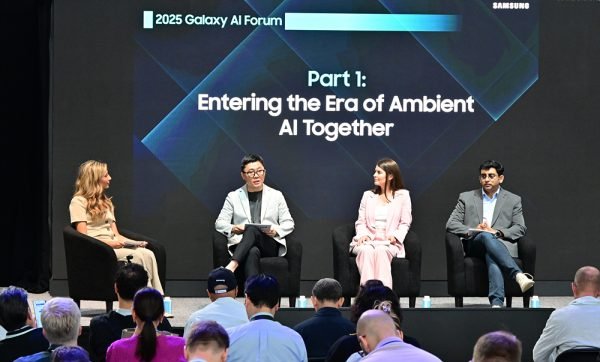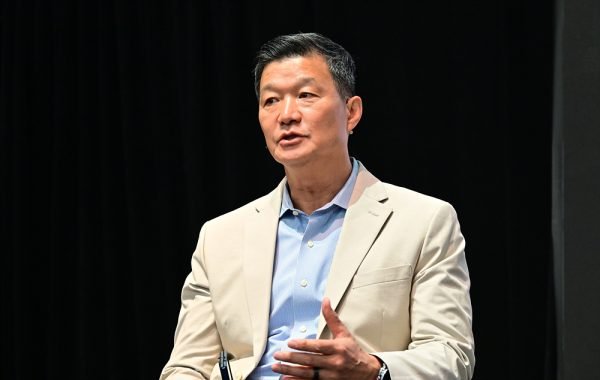Tools & Platforms
Industry Leaders Chart the Future of Mobile Innovation at Galaxy Tech Forum

At Galaxy Unpacked 2025 on July 9, Samsung Electronics unveiled its latest Galaxy Z series devices and wearables — pushing the boundaries of foldable design and connected wellness experiences. These innovations mark the next step in the company’s mission to deliver meaningful, user-centered technology, with Galaxy AI and digital health emerging as key pillars of the journey ahead.
To explore these themes further, Samsung hosted two panels at the Galaxy Tech Forum on July 10 in Brooklyn. Samsung Newsroom joined industry leaders and executives to examine how ambient intelligence and advanced health technologies are shaping the future of mobile innovation.
(Panel One) The Next Vision of AI: Ambient Intelligence
(From left) Moderator Sabrina Ortiz, Jisun Park, Mindy Brooks and Dr. Vinesh Sukumar
The first panel, “The Next Vision of AI: Ambient Intelligence,” explored how multimodal capabilities are enabling the continued evolution of AI in everyday life — blending into user interactions in ways that feel intuitive, proactive and nearly invisible. Panelists discussed the smartphone’s evolving role, the importance of platform integration and the power of cross-industry collaboration to deliver secure, personalized intelligence at scale.
Jisun Park, Corporate Executive Vice President and Head of Language AI Team, Mobile eXperience (MX) Business at Samsung Electronics, opened the conversation by reflecting on Galaxy AI’s rapid adoption. Since the launch of the Galaxy S25 series in January, more than 70% of users have engaged with Galaxy AI features. He then turned the discussion to the next frontier, ambient intelligence — AI that is deeply personal, predictive and ever-present.

Jisun Park from Samsung Electronics
Samsung sees ambient intelligence as AI that is so seamlessly integrated into daily life it becomes second nature. The company is committed to democratizing Galaxy AI to 400 million devices by the end of 2025.
This vision builds on insights from a yearlong collaboration with London-based research firm Symmetry, which revealed that 60% of users want their phones to anticipate needs without prompts — based on daily habits.
“Some see AI as the start of a ‘post-smartphone’ era, but we see it differently,” said Park. “We’re building a future where your devices don’t just respond — they become smarter to anticipate, see and work quietly in the background to make life feel a little more effortless.”
Mindy Brooks, Vice President of Android Consumer Product and Experience at Google, discussed how multimodal AI is moving beyond reactive response to deeper understanding of user intent across inputs like text, vision and voice. Google’s Gemini is designed to be intelligently aware and anticipatory — tuned to individual preferences and routines for assistance that feels natural.

Mindy Brooks from Google
“Through close collaboration with Samsung, Gemini works seamlessly across its devices and connects with first-party apps to provide helpful and personalized responses,” she said.
Dr. Vinesh Sukumar, Vice President of Product Management at Qualcomm Technologies emphasized that as AI becomes more personalized, there is more information than ever that needs to be protected.
“For us, privacy, performance and personalization go hand in hand — they’re not competing priorities but co-equal standards,” he said.

Dr. Vinesh Sukumar from Qualcomm Technologies
Both Brooks and Dr. Sukumar reinforced the importance of tight integration across platforms and hardware.
“Our work with Samsung prioritizes secure, on-device intelligence so that users know where their data is and who controls it,” said Dr. Sukumar.

The AI panel at Galaxy Tech Forum
Moderator Sabrina Ortiz, senior editor at ZDNET, closed the session with a discussion on AI privacy. Panelists agreed that trust, transparency and user control must underpin the entire AI experience.
“When it comes to building more agentic AI, our priority is to ensure we’re fostering smarter, more personalized and more meaningful assistance across our device ecosystem,” said Brooks.
(Panel Two) The Next Chapter of Health: Scaling Prevention and Connected Care
The second panel, “The Next Chapter of Health: Scaling Prevention and Connected Care,” focused on how technology can bridge the gap between wellness and clinical care — making health insights more connected, proactive and usable for individuals, healthcare providers and digital health solution partners. Panelists explored how the convergence of clinical data, at-home monitoring and AI is reshaping the modern healthcare experience.

(From left) Moderator Dr. Hon Pak, Mike McSherry, Dr. Rasu Shrestha and Jim Pursley
Health data is often siloed across systems, resulting in inefficiencies and gaps in care. Combined with rising rates of chronic illness, an aging population and ongoing clinician shortages, the result is a system under pressure to deliver timely, effective care.

Dr. Hon Pak from Samsung Electronics
“Patients and consumers around the world are asking us to hear them, to know them, to truly understand them,” said moderator Dr. Hon Pak, Senior Vice President and Head of Digital Health Team at Samsung Electronics. “And I believe this is the opportunity we have with Samsung, Xealth and partners like Hinge and Advocate. Together, we are creating a connected ecosystem where healthcare can truly make a difference — not just in the life of a patient, but in the life of a person.”
Samsung is addressing this challenge through technological innovation and its recent acquisition of Xealth, a leading digital health platform with a network of more than 500 hospitals and 70 digital health solution providers. Through Xealth, Samsung plans to connect wearable data and insights from Samsung Health into clinical workflows — delivering a more unified and seamless healthcare experience.

Mike McSherry from Xealth
“This , plus your devices — the watch, the ring — are going to replace the standalone blood pressure monitor, the pulse oximeter, a variety of different devices,” said Mike McSherry, founder and CEO of Xealth. “It’s going to be one packaged solution, and that’s going to simplify care.”
This collaboration is designed to empower hospitals with real-time insights and help prevent chronic conditions through early detection and continuous monitoring with wearable devices.

Dr. Rasu Shrestha from Advocate Health
“The reality is that with all of the challenges that exist in healthcare, it is not any one entity that can heroically go in and save healthcare. It really takes an ecosystem,” said Dr. Rasu Shrestha, Executive Vice President and Chief Innovation & Commercialization Officer at Advocate Health. “That’s part of the reason why I’m so excited about Xealth and Samsung — and partners like us — really coming together to solve for this challenge. Because it is about Samsung enabling it. It’s more of an open ecosystem, a curated ecosystem.”
The panel spotlighted the growing shift from hospital-based care to care at home — and the opportunities enabled by Samsung’s expanding ecosystem of connected devices. Data from wearables, including those equipped with Samsung’s BioActive Sensor technology, can provide high-quality input for AI-driven insights.
Paired with Samsung’s SmartThings connectivity and wide portfolio of smart home devices, the company is uniquely positioned to support remote health monitoring and treatment from home.
AI is expected to play a role in reducing clinician workload by streamlining administrative tasks and surfacing the most relevant insights at the right time. Platforms like Xealth offer users a personalized, friendly interface to access necessary information from one place for a more connected healthcare experience.
Tools & Platforms
AI: The new frontier at the Institute for Continued Learning in St. George – St. George News
Tools & Platforms
Colleges should go ‘medieval’ on students to beat AI cheating, NYU official says

Educators have been struggling over how students should or should not use artificial intelligence, but one New York University official suggests going old school—really, really old school.
In a New York Times op-ed on Tuesday, NYU’s vice provost for AI and technology in education, Clay Shirky, said he previously had counseled more “engaged uses” of AI where students use the technology to explore ideas and seek feedback, rather than “lazy AI use.”
But that didn’t work, as students continued using AI to write papers and skip the reading. Meanwhile, tools meant to detect AI cheating produce too many false positives to be reliable, he added.
“Now that most mental effort tied to writing is optional, we need new ways to require the work necessary for learning,” Shirky explained. “That means moving away from take-home assignments and essays and toward in-class blue book essays, oral examinations, required office hours and other assessments that call on students to demonstrate knowledge in real time.”
Such a shift would mark a return to much older practices that date back to Europe’s medieval era, when books were scarce and a university education focused on oral instruction instead of written assignments.
In medieval times, students often listened to teachers read from books, and some schools even discouraged students from writing down what they heard, Shirky said. The emphasis on writing came hundreds of years later in Europe and reached U.S. schools in the late 19th century.
“Which assignments are written and which are oral has shifted over the years,” he added. “It is shifting again, this time away from original student writing done outside class and toward something more interactive between student and professor or at least student and teaching assistant.”
That may entail device-free classrooms as some students have used AI chatbots to answer questions when called on during class.
He acknowledged logistical challenges given that some classes have hundreds of students. In addition, an emphasis on in-class performance favors some students more than others.
“Timed assessment may benefit students who are good at thinking quickly, not students who are good at thinking deeply,” Shirky said. “What we might call the medieval options are reactions to the sudden appearance of AI, an attempt to insist on students doing work, not just pantomiming it.”
To be sure, professors are also using AI, not just students. While some use it to help develop a course syllabus, others are using it to help grade essays. In some cases, that means AI is grading an AI-generated assignment.
AI use by educators has also generated backlash among students. A senior at Northeastern University even filed a formal complaint and demanded a tuition refund after discovering her professor was secretly using AI tools to generate lecture notes.
Meanwhile, students are also getting mixed messages, hearing that the use of AI in school counts as cheating but also that not being able to use AI will hurt their job prospects. At the same time, some schools have no guidelines on AI.
“Whatever happens next, students know AI is here to stay, even if that scares them,” Rachel Janfaza, founder of Gen Z-focused consulting firm Up and Up Strategies, wrote in the Washington Post on Thursday.
“They’re not asking for a one-size-fits-all approach, and they’re not all conspiring to figure out the bare minimum of work they can get away with. What they need is for adults to act like adults — and not leave it to the first wave of AI-native students to work out a technological revolution all by themselves.”
Tools & Platforms
SPU & RevisionSuccess lead AI workshop for student innovation

RevisionSuccess and Sripatum University (SPU) jointly hosted a workshop designed to introduce over 200 students to the applications of artificial intelligence (AI) in education and entrepreneurship.
The event, held at the School of Entrepreneurship on SPU’s Bangkok campus, was designed to provide students with practical experience using emerging digital tools. This workshop is part of an established collaboration between RevisionSuccess and SPU, which includes a formal Memorandum of Understanding, and builds on ongoing efforts to support educational advancement in Thailand.
Collaborative mission
The workshop carried the theme “AIvolution in Education,” focusing on how AI technology can personalise learning, increase engagement, and provide students with skills needed for both academic and professional pursuits. It also provided students with the opportunity to explore how AI can support entrepreneurial activities in a technology-focused business environment.
“Our partnership with RevisionSuccess has always been guided by a shared mission – to give students the tools they need to succeed in the digital age,” said Dr. Kriangkrai Satjaharuthai, Dean of the School of Entrepreneurship at SPU, who delivered the keynote address. “AI is not just a trend; it is becoming the backbone of future education and business. We want our students to be ready for this transformation, and today’s workshop has given them that first-hand experience.”
Hands-on experience
A key activity during the workshop was a large-scale, interactive game that involved all participating students. The game session was designed to demonstrate how AI-powered tools can enhance engagement and collaboration, providing students with a sense of how technology can bring learning concepts to life.
“We believe that learning should not only be effective but also fun, engaging, and scalable,” said Phonlawat Sirajindapirom of RevisionSuccess, who co-led the workshop alongside colleagues Phuwadit Sutthaporn and Pingkan Rerkpatanapipat. “Through this activity, students experienced how AI can bridge the gap between theory and practice, giving them practical insights into how innovation can be applied to their entrepreneurial journeys.”
AI supporting educators
The workshop speakers discussed the role of AI as a supplementary resource for teachers. They highlighted how AI can adapt instruction to individual student needs and simplify complex material, without attempting to replace educators themselves.
“Our role as educators is evolving,” added Dr. Kriangkrai. “Instead of being the sole source of information, we now serve as facilitators who help students use technology to unlock their potential. The key is to embrace AI as an ally, not a competitor.”
Pingkan Rerkpatanapipat of RevisionSuccess also commented on the potential of AI in shaping the learning environment.
“AI offers us the chance to reimagine the classroom – to create a space where learning adapts to the student, rather than the other way around. At RevisionSuccess, we are committed to working hand-in-hand with institutions like SPU to ensure that innovation leads to inclusion and accessibility for all students.”
Entrepreneurial focus
According to the organisers, the workshop’s emphasis on entrepreneurship aligned with national efforts in Thailand to strengthen digital skills and innovation. The agenda included demonstrations of AI as a business tool, intended to prepare students for future careers in a rapidly evolving market.
One student participant reflected on the benefits of the session, stating, “This workshop has broadened my perspective. I can see how AI can help me both in my studies and in the business I want to start after graduation. It makes learning more efficient and gives me new ideas for innovation.”
Feedback from participants indicates that the value students found in connecting their academic experience with real-world business concepts, enabled by AI technology, was significant.
Continuous development
The event concluded with a commemorative group photo featuring Dr. Kriangkrai, other faculty members, and the RevisionSuccess team. Organisers described this closing as a reflection of their commitment to continued collaboration in support of educational adaptation and progress.
“Our collaboration with SPU is about more than hosting events – it’s about creating a movement towards smarter, more inclusive, and more engaging education in Thailand,” said Phuwadit Sutthaporn of RevisionSuccess. “We are excited to continue building on this momentum with future initiatives.”
-
Tools & Platforms3 weeks ago
Building Trust in Military AI Starts with Opening the Black Box – War on the Rocks
-

 Business2 days ago
Business2 days agoThe Guardian view on Trump and the Fed: independence is no substitute for accountability | Editorial
-

 Ethics & Policy1 month ago
Ethics & Policy1 month agoSDAIA Supports Saudi Arabia’s Leadership in Shaping Global AI Ethics, Policy, and Research – وكالة الأنباء السعودية
-

 Events & Conferences3 months ago
Events & Conferences3 months agoJourney to 1000 models: Scaling Instagram’s recommendation system
-

 Jobs & Careers2 months ago
Jobs & Careers2 months agoMumbai-based Perplexity Alternative Has 60k+ Users Without Funding
-

 Funding & Business2 months ago
Funding & Business2 months agoKayak and Expedia race to build AI travel agents that turn social posts into itineraries
-

 Education2 months ago
Education2 months agoVEX Robotics launches AI-powered classroom robotics system
-

 Podcasts & Talks2 months ago
Podcasts & Talks2 months agoHappy 4th of July! 🎆 Made with Veo 3 in Gemini
-

 Podcasts & Talks2 months ago
Podcasts & Talks2 months agoOpenAI 🤝 @teamganassi
-

 Mergers & Acquisitions2 months ago
Mergers & Acquisitions2 months agoDonald Trump suggests US government review subsidies to Elon Musk’s companies



